QuestionRecently my significant other and I adopted a dog.
At his interest in getting a dog, I suggested one from the local newspaper. One that was older and most likely housebroken.
We adopted a eighty-one pound lab/shepard mix named Minny. I was a little concerned initially about the size of her, she is definitely strong enough to pull either of us off our feet and drag us a few yards if she wanted to. But she has shown that she can behave (when she wants to).
This brings me to my problem: when we take her out to go potty she sniffs excessively, for what, I'm not sure. We live in heavily paved area with strips of grass. We make it a point to walk her a few blocks to the nearest lot of grass and never rush her. But she just NEVER stops sniffing and NEVER goes to the bathroom. In fact, she will wait and hold any an all movements til she is inside the apartment. This is problematic since its impractical at because we take her out right before we leave and right before we go to bed, but she waits til we're not in the room and then uses the bathroom.
We've tried to "crate" her the best that we can by sectioning off a small area of the hallway just large enough for her bed when we leave, but she pees anyway.
We would make sure she doesn't have any food or water when we're gone, but sometimes we're gone for longer than I'm comfortable leaving her without food. She's a large dog, and the previous owner's treatment was questionable (who feeds a dog macaroni and cheese?), we already have problems getting her to eat because the owner before used to feed her only once a day, and cut the dog food with chicken or bacon grease. She's finicky and is very bad around people food and is consistently getting into the garbage.
I'm not really sure what else to do about this sniffing. She knows she shouldn't go inside, and she shows interest in going outside, yet she never uses the bathroom. I was wondering if there is any particular reason why a dog that was supposedly house trained, won't go outside?
Her previous owner said she had rescued Minny from some owners in our town, but many of her statements about the dog were contradictory. We're not sure exactly what this dog's past was. While she genuinely cared for the dog and was very afraid to see her go, we really think that this dog incurred some neglect with this owner. She hinted that the dog would chew anything she found in the yard (they just kept her outside the seven months they had her), I wonder how far that range of "anything" went to.
She's such a sweet dog, we're so willing to work with her, but I'm completely mystified by her inability to connect the outside with potty.
AnswerThe dog is NOT HOUSE TRAINED. You are seeing just ONE of the reasons her former owner dumped her. The report from former owner that she adopted this dog from someone else is not credible; you have a very large dog that is totally not house trained and has other very bad habits. Adopting a dog from anyone on the Internet (instead of from a credible rescue where the dog has been fostered and/or carefully observed and evaluated) is a HUGE error unless you are able to evaluate the dog's temperament and ask the right questions. Even then, it's a grab bag. People neglect and abuse dogs as if they are stuffed animals. It's a disgrace.
I have no idea how old this dog is, and most likely you don't either, since you can't believe one word from her former owner. Let's tackle the easy part first: no physiologically sound dog will EVER starve itself. If the dog is accustomed to having something added to her food to make it palatable (to her), she will wait until you do that. Don't do that. Feed her a high quality kibble with a low protein content (for indoor, inactive dogs) NOT some supermarket brand. Since you have only one dog, this should be highly doable. Most pet chains carry at least one high quality dry dog food and it is also available on the internet. Do some homework online. Feed the dog TWICE A DAY, morning and late afternoon. NEVER WITHHOLD WATER FROM ANY DOG FOR ANY REASON.
Taking a dog out TWICE A DAY is INHUMANE. Would YOU be able to urinate/defecate only TWICE A DAY? NO. This dog needs to be housetrained. Learn about positive reinforcement training (read Patricia McConnel Ph.D. or go to Karen Pryor's web site) and introduce a cue (clicker or other signal). USE that cue to reinforce her elimination outdoors. Do not allow her to range a large territory; confine her to a much smaller territory CLOSE to your home; give her a great deal of opportunity to eliminate outdoors (take her out on leash every four to five hours for fifteen minutes each session to the SAME LOCATION; walk in circles (as this is the natural behavior of a dog that is about to urinate); cover the same ground each time so her scent will be the most predominant); REWARD (with cue and small food reward such as cheese) every single time she eliminates outdoors. (Why you say this dog "knows" she's not supposed to urinate indoors is a mystery; she obviously HAS NO IDEA.) While you are taking this dog out at liberal intervals, keep a house tab (lightweight leash of training length, 15 feet) on her indoors (when you are at home) and do not allow her out of your sight. Getting this dog to eliminate outdoors for the first time will be your greatest challenge. If you observe her closely indoors and confine her on long lead, and if you take her out every five hours (at LEAST, until she urinates outdoors several times) to the SAME SPOT every day, she WILL eventually HAVE TO urinate outdoors. Once she has begun doing so, you can expect her to repeat this behavior (to the SAME SPOT OUTDOORS every time) and you will reward her (with click/signal and food reward) EVERY SINGLE TIME she does it. It will take approximately 30 to 40 repetitions once the dog has begun to eliminate outdoors for the dog to acquire a conditioned response and begin (JUST BEGIN) to understand that urinating outdoors is REWARDING (because YOU are rewarding it.) She will still have accidents inside which you must IGNORE; an adult dog, if properly introduced to house training, should acquire a fully compliant response in a few months but may have occasional "accidents" which you MUST IGNORE. Rewarding appropriate elimination EVERY TIME is what works.
If you are unable to observe her indoors, keep confining her to an area that is easily cleaned, but do NOT withhold water. Choose a location that is NOT NEAR THE GARBAGE and not anywhere she can get into trouble, like the laundry room or a bathroom. FEED HER TWICE A DAY IN THAT LOCATION. Dogs are normally (unless neglected and conditioned otherwise by circumstances) clean in the area where food is available. Keep taking her out at three hour intervals until she routinely begins to urinate outdoors, then slowly increase the intervals to four hours, five hours, then AT LEAST THREE TIMES DAILY. Do this VERY SLOWLY. The dog must TRUST that she will be allowed outdoors for elimination and she MUST be rewarded every single time she does it. Her former owners no doubt confined her outdoors because they COULD NOT house train her, but this only instilled in her a behavior of eliminating wherever and whenever she had to. THIS DOG IS NOT HOUSE TRAINED and if you unfairly punish her for eliminating inside she will REFUSE TO ELIMINATE IN FRONT OF YOU (which is MOST LIKELY WHY IS ISN'T DOING IT.)
The dog is sniffing because she is scenting, that is a normal behavior. That is NOT your problem; your problem is correcting the result of INHUMANE TREATMENT she has received at the hands of human miscreants.
You say you are gone for longer than you are comfortable leaving her without food. WHAT DOES THIS MEAN????? If you are gone more than twelve hours at a time, WHY DID YOU GET A DOG??? This is a life sentence of MISERY for a dog. You appear to have bizarre and unrealistic attitudes about this animal. THIS IS A LIVING CREATURE. She requires food and water, she requires fair and HUMANE TREATMENT, she requires consistent interaction with her human cohabitants, and she requires that YOU, the human, know more than she does. Learn about dog psychology; give this dog the FAIR treatment she deserves; stop expecting "Lassie" from a dog someone else threw away; DO THE WORK REQUIRED to help this dog to habituate to living indoors and BE PRESENT FOR HER, do NOT leave her alone for more than normal working hours.

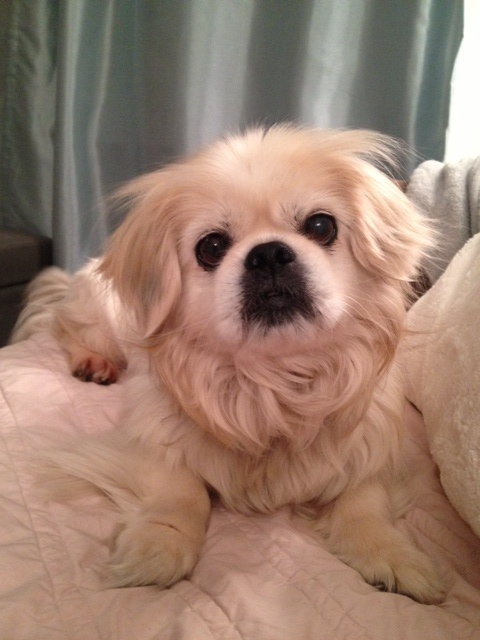 Nightmares?
Question
Beethoven
Hi Melissa, Ive had my very h
Nightmares?
Question
Beethoven
Hi Melissa, Ive had my very h
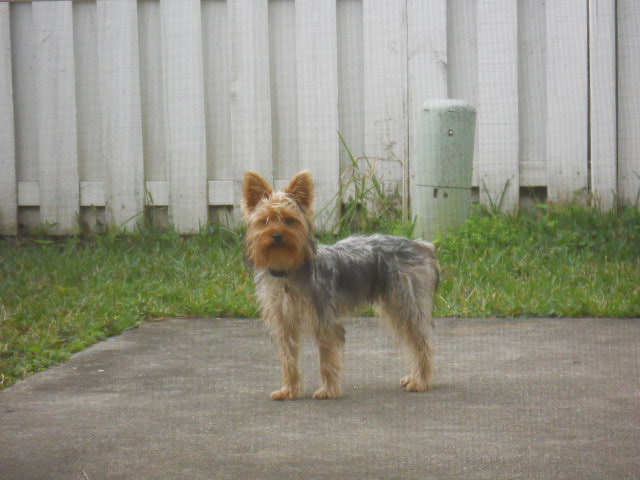 agressive silky terrier
Question
Lucas 1 year old
Hi Jennifer:
I have a
agressive silky terrier
Question
Lucas 1 year old
Hi Jennifer:
I have a
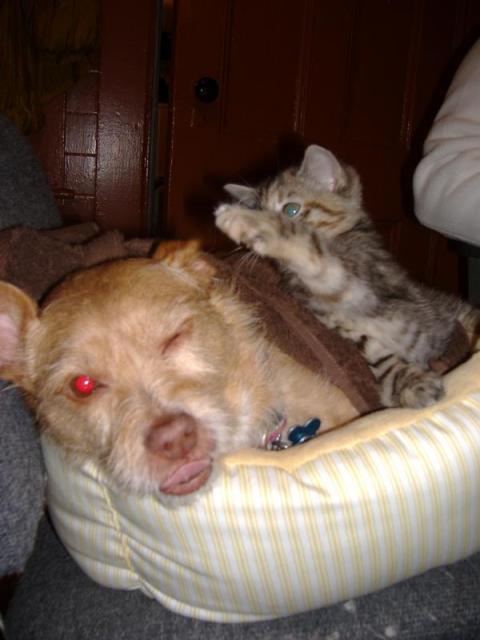 My dog is shaking and hiding under my bed recently
QuestionRorrie and Pencil
QUESTION: My dog, Rorr
My dog is shaking and hiding under my bed recently
QuestionRorrie and Pencil
QUESTION: My dog, Rorr
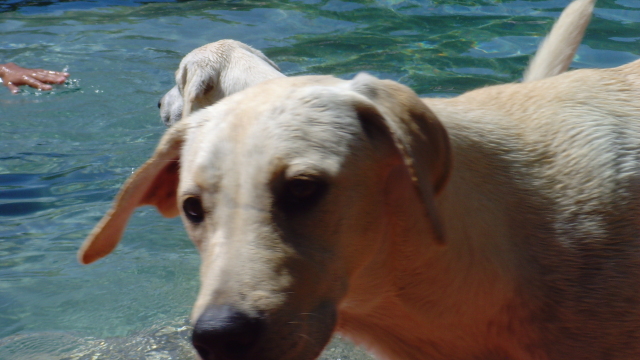 Psychological trauma
Question
Izzy
I recently took my 1 year old dog to a fr
Psychological trauma
Question
Izzy
I recently took my 1 year old dog to a fr
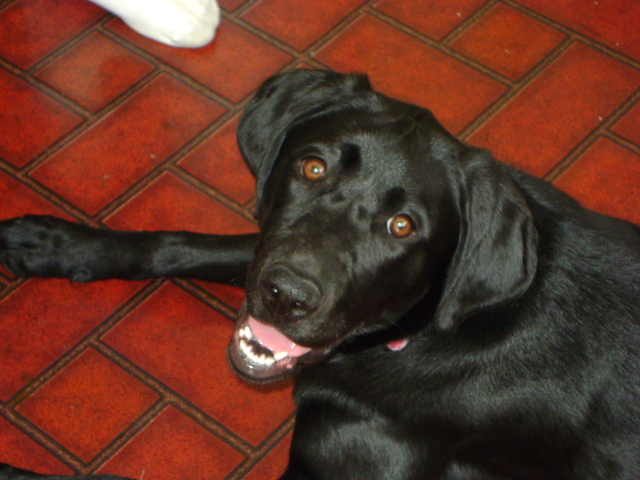 Black lab - 1 yr
QuestionSheba
QUESTION: My lab loves to bite her
Black lab - 1 yr
QuestionSheba
QUESTION: My lab loves to bite her